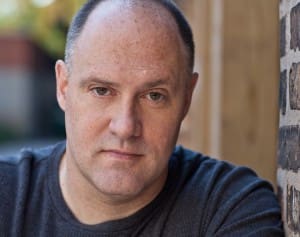 Tell us about yourself and how many books you have written.
Tell us about yourself and how many books you have written.
I’m a long-term resident of Chicago who has worked predominantly in university administration. Given my English and Theatre background, I didn’t expect to be involved with building databases, handling accounts payable, debriefing former gang members, or registering students for music lessons.
I started writing novels when I was in my teens, and knew this was what I wanted to do as a career. Some of my favorite times in life have been those in which I could devote full-time to writing. It’s exhilarating, relaxing, fun, agonizing, and the best, best way to spend my day.
How many novels have I written? Well, should I include all the ones I wrote in my teens before I knew what I was doing?
I’ve published one novel, Dead Hungry, and I’ve written a play, A Careful Wish, which was first produced in 2008. I am currently working on a novel entitled Reston Peace.
What is the name of your latest book and what inspired it?
Dead Hungry is the story of Ghouls in modern-day Chicago. Unlike undead zombies, Ghouls are humans with a predilection for flesh.
I developed the premise after reading Stephen King’s Danse Macabre, his nonfiction examination of the horror genre from the 1950s-1970s. In particular, his critique of Romero’s Night of the Living Dead reminded me how scary a movie it was.
Zombies are a particularly popular subgenre right now, and I thought there were plenty of good writers tackling the topic. Ghouls fall into a similar category — flesh-eating — but I was intrigued by the notion of these being non-supernatural beings. It seemed more horrific to consider what the world would be like if this subset of individuals began moving into the mainstream, and how society might adapt.
Do you have any unusual writing habits?
After sketching an outline, I write the first draft in short bursts. Then, when I see what I have, I take my time fashioning the story arc that has emerged. Revising subsequent drafts takes time, because my brain digs down into the details, exploring the options, jettisoning the parts that don’t work, and building the bridges that might be missing from the first draft.
What authors, or books have influenced you?
I love Victorian-era fiction: Dickens, Eliot, Melville. More contemporary authors: John Irving, Jane Smiley, Kazuo Ishiguro.
More recently, I’ve been discovering indie authors and loving their enthusiasm. I love unusual nonfiction and novels that cross genres or bend the rules.
What are you working on now?
I’m working on Reston Peace, which focuses on the disparity between real life and fictional entertainment.
Kenny Reston’s life is used as a case-study for a book on young men who were sexually abused. The book proves enough of a bestseller to garner the attention of a filmmaker, who wants to adapt Kenny’s story into a movie.
Kenny watches as his life is translated into entertainment. It forces him to reconsider how the abuse has far-ranging consequences throughout his life, and how he has worked hard to heal.
The novel is told from Kenny’s perspective, interspersed with excerpts from the case-study and the screenplay.
What is your best method or website when it comes to promoting your books?
Facebook, Twitter, GoodReads. I’m exploring more sites like Awesome Gang for a way to connect with readers and other indie writers.
Do you have any advice for new authors?
Write a messy first draft (thanks, Anne Lamott). To the best of your ability, turn off your censor, and blunderbuss all the words you can onto the page.
From there, step back to see what you’ve got, and that’s when you can start writing.
What is the best advice you have ever heard?
Trust your process. Consider the expression, “Write What You Know.” It doesn’t mean you have to write autobiography. There are a lot of things we know — love, heartache, loss, stress. It’s the emotions that draw us into a story. The careers or environments of the characters is the framework, and that you can learn about through research.
What are you reading now?
The Best American Non-Required Reading — one of my all-time favorite series.
The Perks of Being a Wallflower, by Stephen Chbosky
Requiem for a Paper Bag: Celebrities and Civilians Tell Stories of the Best Lost, Tossed, and Found Items from Around the World, edited by Davy Rothbart
What’s next for you as a writer?
More book promotion. My next novel will use Thoreau’s Walden as its starting point.
If you were going to be stranded on a desert island and allowed to take 3 or 4 books with you what books would you bring?
Walden, by Henry David Thoreau. I’ve lost track of the number of times I’ve read it, and it always wakes me up.
The entire collection of The Best American Non-Required Reading, edited by Dave Eggers. There’s so much there to enjoy — varied and different.
Author Websites and Profiles
Louis Arata Website
Louis Arata Amazon Profile
Louis Arata Author Profile on Smashwords
Louis Arata’s Social Media Links
Goodreads Profile
Facebook Profile
Twitter Account